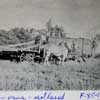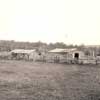1915-1939
 In the 1920s, a significantly large portion of immigrants entered Canada. According to data available, 612 Estonians immigrated to Canada from 1922 to 1930. This trend however, dissipated in the 1930-40's as the Great Depression forced the Canadian government to place restrictions on immigration. There were years in which Canada received one or less Estonian immigrant (i.e., 1930, 1931). During the inter-war era a relatively small number of Estonians settled in Alberta. Estonians who did immigrate to Canada, in effort to escape Estonia's uncertain political environment, were more attracted to Canada's eastern provinces rather than the prairie settlements. Employment in a variety of different sectors was more attainable in Canada's larger cities. The demographic makeup of the new settlers varied from decades earlier; the majority of Estonians were young, single men and women who described themselves as tradespeople, small merchants, domestic servants, and manual labourers.
In the 1920s, a significantly large portion of immigrants entered Canada. According to data available, 612 Estonians immigrated to Canada from 1922 to 1930. This trend however, dissipated in the 1930-40's as the Great Depression forced the Canadian government to place restrictions on immigration. There were years in which Canada received one or less Estonian immigrant (i.e., 1930, 1931). During the inter-war era a relatively small number of Estonians settled in Alberta. Estonians who did immigrate to Canada, in effort to escape Estonia's uncertain political environment, were more attracted to Canada's eastern provinces rather than the prairie settlements. Employment in a variety of different sectors was more attainable in Canada's larger cities. The demographic makeup of the new settlers varied from decades earlier; the majority of Estonians were young, single men and women who described themselves as tradespeople, small merchants, domestic servants, and manual labourers.
 Discussion of the inter-war period is not complete without mention of the Great Depression and its impact on Alberta's economic and social landscape. Most Albertans, including many Estonians, could not escape the devastation caused by the Great Depression. Unemployment skyrocketed in the early 1930s, wheat prices dropped substantially, drought engulfed much of the prairies, and grasshoppers ravaged farmers' fields. In 1934, a hailstorm caused significant damage in Stettler and surrounding areas. Thousands of acres of wheat were ruined while horses, chickens and herds of cattle perished. One historian even noted that "the Depression became a term engraved on people's minds and was the decisive factor in most personal decisions". For Alberta's Estonian community, cooperation and preservation of the traditional concept of family not only ensured the continuation of Estonian culture in Alberta, but it also served as a useful tool against the hardship brought forth by the Great Depression.
Discussion of the inter-war period is not complete without mention of the Great Depression and its impact on Alberta's economic and social landscape. Most Albertans, including many Estonians, could not escape the devastation caused by the Great Depression. Unemployment skyrocketed in the early 1930s, wheat prices dropped substantially, drought engulfed much of the prairies, and grasshoppers ravaged farmers' fields. In 1934, a hailstorm caused significant damage in Stettler and surrounding areas. Thousands of acres of wheat were ruined while horses, chickens and herds of cattle perished. One historian even noted that "the Depression became a term engraved on people's minds and was the decisive factor in most personal decisions". For Alberta's Estonian community, cooperation and preservation of the traditional concept of family not only ensured the continuation of Estonian culture in Alberta, but it also served as a useful tool against the hardship brought forth by the Great Depression.








